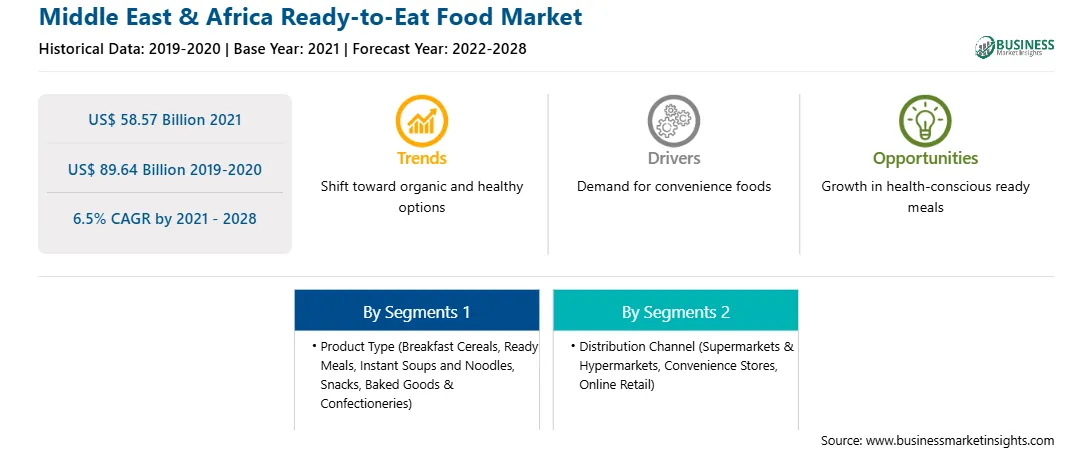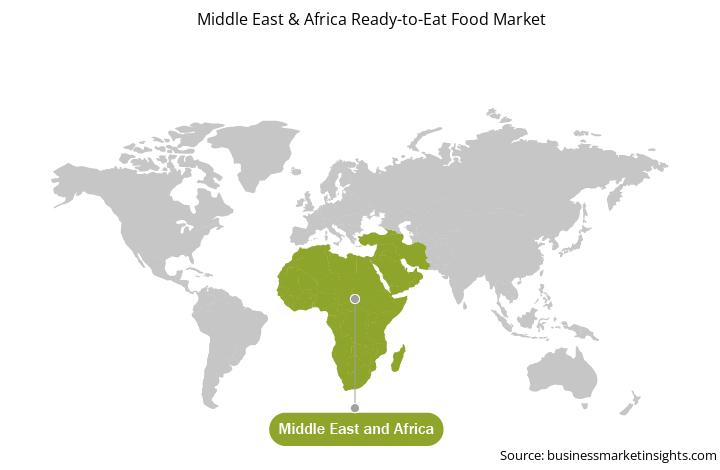The ready-to-eat food market in Middle East & Africa is expected to grow from US$ 58.57 billion in 2021 to US$ 89.64 billion by 2028. It is estimated to grow at a CAGR of 6.5% from 2021 to 2028.
Over the past few years, awareness regarding health and nutrition has increased significantly. Due to hectic work schedules and extended working hours, people fail to concentrate on their health and fitness, resulting in obesity, diabetes, eye, and skin problems, among other health issues. Therefore, consumers have started looking for RTE products that offer enhanced health benefits. They are changing their dietary habits to include nutrient-rich packaged food in their diets. Also, with the rising prevalence of diabetes, the preference for sugar-free products is increasing continuously.
According to the World Health Organization (WHO), in 2019, diabetes ranked ninth among the leading causes of death, with ~1.5 billion deaths directly caused by the disease. Thus, manufacturers are focused on offering sugar-free ready-to-eat food. Obesity is one of the most important public health issues in the region. Obesity and overweight rates in children and adults continue to rise. As per a survey conducted by Ipsos in 2020, 19% of adults worldwide identified obesity as the most serious issue they faced. As a result, people's preferences are increasingly shifting toward low-carb, low-fat, and sugar-free diets. In October 2019, PepsiCo launched a ready-to-eat popcorn snack named Smart50 in its Better-for-You Snacks portfolio, which includes RTE food products with the calorie content reduced by 50 calories or less. The Smart50 is whole-grain popcorn that is free from artificial flavors.
With health becoming a top priority for consumers worldwide, consumers are willing to pay more for products that offer enhanced health benefits. Thus, the increasing focus on health is driving innovation in ready-to-eat food, which is expected to bring new trends to the market during the forecast period.
With new features and technologies, vendors can attract new customers and expand their footprints in emerging markets. This factor is likely to drive the Middle East & Africa ready-to-eat food market at a substantial CAGR during the forecast period.
Middle East & Africa Ready-to-Eat Food Market Segmentation
The Middle East & Africa ready-to-eat food market is segmented on the basis of product type, distribution channel, and country. Based on product type, the market is segmented into breakfast cereals, ready meals, instant soups and noodles, snacks, baked goods & confectioneries, and others. In 2021, the others segment held a larger market share, and the ready meal segment is expected to register a higher CAGR during the forecast period.
Based on distribution channel, the market is segmented into supermarkets & hypermarkets, convenience stores, online retail, and others. In 2021, the convenience stores segment held the largest market share, and the online retail segment is expected to register the highest CAGR in the market during the forecast period. Based on country, the market is segmented into Saudi Arabia, the UAE, South Africa, and the Rest of the MEA. In 2021, the Rest of MEA held the largest market share, and the UAE is expected to grow at the fastest CAGR during the forecast period.
Nestlé SA; Conagra Brands Inc.; The Kraft Heinz Company; General Mills Inc.; MTR Foods Pvt Ltd.; Hormel Foods Corporation; JBS S.A.; and The Kellogg Company are a few leading companies in the Middle East & Africa ready-to-eat food market.
Strategic insights for the Middle East & Africa Ready-to-Eat Food provides data-driven analysis of the industry landscape, including current trends, key players, and regional nuances. These insights offer actionable recommendations, enabling readers to differentiate themselves from competitors by identifying untapped segments or developing unique value propositions. Leveraging data analytics, these insights help industry players anticipate the market shifts, whether investors, manufacturers, or other stakeholders. A future-oriented perspective is essential, helping stakeholders anticipate market shifts and position themselves for long-term success in this dynamic region. Ultimately, effective strategic insights empower readers to make informed decisions that drive profitability and achieve their business objectives within the market.

| Report Attribute | Details |
|---|---|
| Market size in 2021 | US$ 58.57 Billion |
| Market Size by 2028 | US$ 89.64 Billion |
| Global CAGR (2021 - 2028) | 6.5% |
| Historical Data | 2019-2020 |
| Forecast period | 2022-2028 |
| Segments Covered |
By Product Type
|
| Regions and Countries Covered | Middle East and Africa
|
| Market leaders and key company profiles |
The geographic scope of the Middle East & Africa Ready-to-Eat Food refers to the specific areas in which a business operates and competes. Understanding local distinctions, such as diverse consumer preferences (e.g., demand for specific plug types or battery backup durations), varying economic conditions, and regulatory environments, is crucial for tailoring strategies to specific markets. Businesses can expand their reach by identifying underserved areas or adapting their offerings to meet local demands. A clear market focus allows for more effective resource allocation, targeted marketing campaigns, and better positioning against local competitors, ultimately driving growth in those targeted areas.

The Middle East & Africa Ready-to-Eat Food Market is valued at US$ 58.57 Billion in 2021, it is projected to reach US$ 89.64 Billion by 2028.
As per our report Middle East & Africa Ready-to-Eat Food Market, the market size is valued at US$ 58.57 Billion in 2021, projecting it to reach US$ 89.64 Billion by 2028. This translates to a CAGR of approximately 6.5% during the forecast period.
The Middle East & Africa Ready-to-Eat Food Market report typically cover these key segments-
The historic period, base year, and forecast period can vary slightly depending on the specific market research report. However, for the Middle East & Africa Ready-to-Eat Food Market report:
The Middle East & Africa Ready-to-Eat Food Market is populated by several key players, each contributing to its growth and innovation. Some of the major players include:
The Middle East & Africa Ready-to-Eat Food Market report is valuable for diverse stakeholders, including:
Essentially, anyone involved in or considering involvement in the Middle East & Africa Ready-to-Eat Food Market value chain can benefit from the information contained in a comprehensive market report.